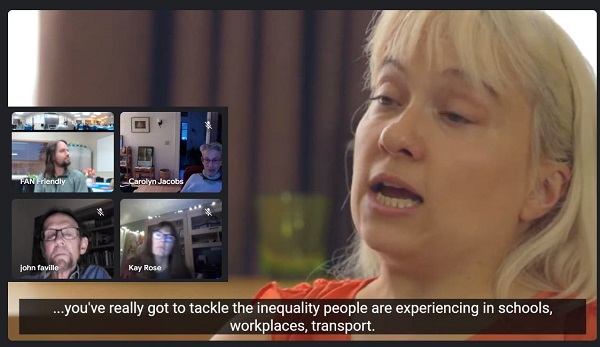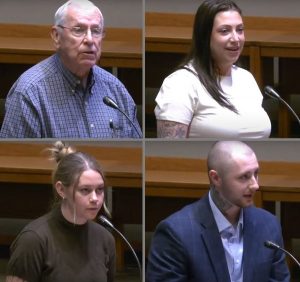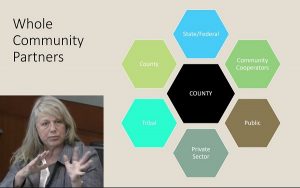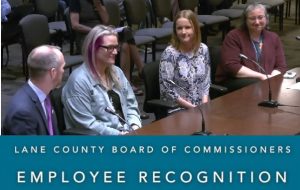LILA shares tips to make meetings more inclusive
12 min read
The Neighborhood Leaders Council asked how to make meetings more inclusive. On March 26, from LILA—the Lane Independent Living Alliance—Scott Lemons.
Scott Lemons (Lane Independent Living Alliance): I am so honored to be here. And I would love to go through a little bit of how we can make these commissions, which I’m a part of, and also the board that you’re a part of, more inclusive for people with disabilities, but also for everyone. Human rights is disability rights.
[00:00:27] The ADA (Americans with Disabilities Act) definition of a disability is ‘a physical or mental impairment that substantially limits a major life activity.’ Twenty percent of your neighbors—20% of the people that you want to be showing up at these meetings—have a disability. Almost 20% of every single person we encounter has a disability, whether or not they realize it or talk about it. Oregon actually has much higher rates of disability, especially when it comes to mental health.
[00:00:54] About 20% of people may pass away without having a disability, but that means 80% of us will experience a disability. People with disabilities—we are the most historically marginalized group that almost everyone can hope to be a part of at some point in their life.
[00:01:12] John Q: Scott shared two models for framing disability: the medical and the social models. He shared definitions from an online video.
[00:01:20] Shape Arts video: According to the medical model of disability, the word disabled means less able: less able to achieve your potential; less able to have meaningful relationships; less able to play an active part in the world around you, and that this is just your bad luck. This outdated view of the world puts a responsibility of overcoming disabling barriers on the person with an impairment.
[00:01:43] But this idea is changing. The more modern social model of disability says that a person doesn’t have a disability but that they are disabled. They are disabled by society. It is the attitudes and physical barriers imposed on them by society that prevents them from achieving their potential.
[00:02:01] The social model was developed by disabled people and their allies to help them take action against discrimination and to empower people to find solutions, to remove barriers, and campaign together for equality and human rights.
[00:02:15] What we learn from the social model of disability is that disability is a social construct created by social barriers, barriers which can be eliminated. We learn that it is the responsibility of government, public spaces, businesses, and individual people to make the changes, to increase the access and build a more equal society where everyone has the opportunity to reach their full potential.
[00:02:44] Scott Lemons (Lane Independent Living Alliance): That one was a great outline about it and the next one is a bit more personal story about why this difference in thinking matters.
[00:02:52] Scope video (Disability equality charity in England and Wales): Discovering the social model actually was a massive liberation on another level. Yeah, I was being treated differently and no, it wasn’t me being deficient. It was everybody else’s social anxiety that were being projected onto me.
[00:03:06] The blame for you not fitting in is no longer on your shoulders.
[00:03:14] Suddenly my disability is out there, and not in here. It was what made me realize that I was something beyond the thing that other people thought I was.
[00:03:26] Which is a real liberating thing but it also means you can change it. We can say to the world: ‘Look, you must put a lift in this building. You must make sure that the signage is readable for people with visual impairments.’
[00:03:37] If you want that equality to be real, you’ve really got to then tackle the inequality people are experiencing in schools, in workplaces, with transport.
[00:03:48] Come the joyous day (if it ever came), where all those barriers went, you know, we’d just be people with impairments. We wouldn’t be disabled people anymore.
[00:04:08] Scott Lemons (Lane Independent Living Alliance): They just spoke so much better than I could, but I would not be sitting here speaking to you today if it wasn’t for the principles that that y’all just saw, and the champions in the city—Jensina (Hawkins) being one of them—that actually made me feel that I am included, important, and my perspective matters, and that’s really why I’m here today, is to encourage you all and help to find strategies to include people with disabilities and gosh, we are the biggest untapped resource in society.
[00:04:41] John Q: Scott Lemons from the Lane Independent Living Alliance spoke about the importance of language.
[00:04:47] Scott Lemons (Lane Independent Living Alliance): I would encourage you to use ‘people with disabilities,’ person-first language, so that always focuses on the person, not their disability, focuses on their ability, also not their disability, and it draws attention to the unique parts of that individual, whereas that disability-first language, it destroys our soul. It draws attention to our limits and our weaknesses.
[00:05:11] So just for example, instead of saying ‘suffers from cerebral palsy,’ you know, ‘a person with cerebral palsy.’ ‘A person who suffers from anxiety and depression’, not ‘an anxious depressed person.’
[00:05:24] John Q: He listed ways to improve interaction.
[00:05:28] Scott Lemons (Lane Independent Living Alliance): Please talk to them as a person. Talk to them if they have a companion or a peer support specialist. The companion or peer support specialist is there to mediate and explain, but you are talking to the person, you’re not talking to the person that’s helping them.
[00:05:45] We are adults, please treat us as such. And really: Ask the question, if you are unsure as to how to maneuver a situation or you need help, we’re more than happy to tell you. Just ask.
[00:05:58] Please see the wheelchair as an extension of that person’s body. You would never go and touch someone’s knee without being like, ‘Can I touch your knee?’ Well, also, same with the wheelchair.
[00:06:11] People with speech disabilities. A person with a speech disability may be difficult to understand, so please give him or her or they your full attention. If you don’t understand, ask the person to repeat themselves. If you’re not sure, clarify, you know, always clarify. You might need to ask a person with a speech disability to write something down so you can understand it, or so the entire commission can understand it.
[00:06:37] And that’s one thing I’ve really appreciated about the Human Rights Commission and Police Commission is that I have enough time to craft and create a statement for either my opening or my closing. Whereas I think most people in this room are doing things on the fly. And understanding that sometimes people need time to think and giving them maybe, you know, 24 to 48 hours to submit any future comments.
[00:07:01] Always allow the person to finish, always, even if you’re not understanding. You can clarify later. Never pretend you understand. Never pretend.
[00:07:10] Please don’t confuse psychiatric with cognitive disabilities. Those are two very different communities which both deserve their own individual respect and they need to be treated in different ways and accommodated in different ways.
[00:07:24] People with psychiatric disabilities are no more likely—actually we’re less likely—to be violent than anybody else. That is a stereotype. That is not true whatsoever. But please don’t assume that people like me can’t make decisions or handle stress.
[00:07:42] I might take two hours after a Police Commission to de-stress afterwards. And that’s something that I really hope that you all consider when you’re considering the future of policies and bylaws. But it doesn’t mean I’m not willing to do it. It also means that it taxes a person with a disability more than it may other people in this room.
[00:08:02] People with psychiatric disabilities have been told time and time again that we do not matter, we’ve been gaslit into thinking that our ideas don’t even exist or they’re the wrong ideas, and that’s the medical model gaslighting us. So any ideas that we come to the table with, please take as any other idea would come. And then go through the voting process and everything else.
[00:08:29] When you’re speaking to someone who’s blind, make sure that you’re making noise around them and announcing yourself that you’re approaching beforehand. Always speak in a normal tone. But I think we should all do that as humans anyways.
[00:08:43] But being like a guided sight person for a blind person is actually really important and would be really great to have people in here. So it’s like, ‘Hey, I’m offering you my shoulder. Do you want to hold it?’ It is up to them whether they want the help. Asking for help is a strength, not a weakness.
[00:09:01] People who are deaf are hard of hearing. Let the person take the lead in establishing the communication. That’s just, lip reading and language, writing notes and there’s other forms of communication as well.
[00:09:14] Please just take direction from them. And honestly, that’s their core theme through all of this, is, take directions from us. And always talk to us directly. If they lip-read, based on the person, please make the most effective and the most easy way for them to be included. And, quite honestly, whether we’re talking about people with disabilities or not, facial expressions and body language mean everything. You’re looking more for lips, you’re looking more for body language. So please be aware of that as well.
[00:09:49] People with cognitive disabilities: Always speak slowly, just to make sure that they’re keeping on track with you. And when that comes to this kind of setting, if you have this meeting publicly recorded, you can always slow down the meeting to 0.75 or 0.5 (times the normal speed) and become a closed-captioned phone. There’s so many technologies at work. There’s so many beautiful ways. Granted, technology is not our solution, but a small step.
[00:10:22] And then also when it comes to people with cognitive disabilities: Always use like concrete reasoning. Abstract, abstractions are hard for all of us, certainly for people with cognitive disabilities. And like I’ve been saying with everything, don’t assume anything whatsoever and always talk to the person directly.
[00:10:45] John Q: How can meeting organizers include and involve more people?
[00:10:50] Scott Lemons (Lane Independent Living Alliance): We have not been listened to for a long time, and we want to be a part of it. We really want to.
[00:10:55] We really just want to be included. There’s been so many meetings like this that I’ve shown up to that I’ve just stood in the corner and nobody talked to me and that’s why people with disabilities don’t really understand how we can be involved in civic engagement.
[00:11:12] Please ask us to be involved and just acknowledge that we’re here.
[00:11:17] Also wait for the person to ask for assistance. The assistance of ‘Hey, I see you’re here, welcome. Here’s all of our amenities,’ is different than: ‘Can I help you in this specific way?’ Always listen, always listen.
[00:11:34] And then one big point is, and I know this can be a very sensitive topic: Always just relax. We’re just people too. We understand that we have some limitations and really, just ask us how you can help us be a better part of the meeting.
[00:11:53] And so, in summary, just make sure your facilities are accessible to people with a variety of disabilities, not just the 1992 ADA disabilities. Treat people as adults. Connect with people. Don’t see them for their disability. Speak to them one-on-one, not whoever they need, not their technology—one-on-one. Treat people as individuals. Understand that we have unique talents, interests, and preferences, just like you all do. And like I’ve always said, when in doubt, always ask. And please relax, be authentic and spontaneous. I think that’s the most genuine way and best way to make connections.
[00:12:35] We also have a very unique perspective. We have not been cared about for so long that we’ve created our own community that cares about ourselves. And I encourage you all to invite us into your spaces and encourage us do the same, because we have our own spaces and our own culture as well. But we are all human. Disability rights are human rights.
[00:12:58] John Q: Scott was asked about intersectionality.
[00:13:03] Scott Lemons (Lane Independent Living Alliance): The intersectionality with disability: People with disabilities also are people of different races. They also are people of different gender and sexual identity.
And that’s why I started this as, you know, ‘Disability rights is human rights,’ because there is so much intersectionality. When you’re talking about the specific cultural nuance that you were discussing, the disability culture and our society, we’re not a monolith. We are made up of many individuals, and therefore every individual’s truth matters.
[00:13:35] John Q: He was asked about increasing rates of depression among people ages 18 to 27.
[00:13:41] Scott Lemons (Lane Independent Living Alliance): They’re seeing such an uptick in depression and anxiety, depression specifically, in the 18-to-27-year-old range. That’s something for us to all be prepared for.
[00:13:51] John Q: Scott said the U.S. might consider creating a new position.
[00:13:55] Scott Lemons (Lane Independent Living Alliance): Sweden created, and I think the U.K. also just did, a Minister of Loneliness. And like, really connection and purpose, that’s the only reason I’m here today is connection and purpose. There’s so many people, whether it’s disability, whether it’s age-related, whether it’s any other factor. That’s one of the biggest killers in society. So America, I would fully encourage a Minister of Loneliness.
[00:14:21] John Q: He was asked about ways to improve hybrid meetings.
[00:14:25] Scott Lemons (Lane Independent Living Alliance): Hybrid meetings, I’m so glad that Oregon put this law into place during COVID. It makes it not just more accessible for people with disabilities. but for anyone with a tight schedule or any other thing.
[00:14:41] But also, please don’t assume that people know how to use your computer. I don’t know how to log into this, so I would suggest putting out not just in a paper format, but in a digital format and any other format you all can come up with, how to log on to our meetings, step by step. And you might think it’s step-by-step, and then break it down to step-by-step-by-step.
[00:15:01] And then I would love to talk about the timing of your meetings and the location of your meetings as well. So we are meeting here at The (Eugene) Mission. And thank you. Shout out to The Mission. They are your neighbors. And this meeting is happening while they are all having to check in and they cannot be here right now. They’re your neighbors.
[00:15:23] And the bus lines. Really please consider your locations when it comes to bus lines. A lot of people with disabilities, they have to use the bus. So not just location of bus lines, but timing with the bus schedule, and collaboration with LTD to make sure that this can happen. We all know this is possible. Let’s do it.
[00:15:46] What I would suggest just off the cuff would be: Create alternative meetings, or at least alternative ways of providing feedback into meetings if you can’t make some meetings. So maybe like submit your comments three days before and we’ll accept them two days after.
[00:16:01] John Q: He shared his experience with the Downtown Neighborhood Association, as an example of how to be more inclusive.
[00:16:09] Scott Lemons (Lane Independent Living Alliance): And I would always get these DNA (Downtown Neighborhood Association) little yellow flyers. Never once did I understand what that was about nor did I understand that I actually wanted to be heard from and it would have been very easy for someone from that neighborhood organization to show up to our community room and give a one-hour presentation on, ‘We really want you and this is how you can access our services.’
[00:16:36] So maybe thinking about your recruitment strategies and how to get more diverse…and I encourage you all to think of everyone, as yourselves as disabled…
[00:16:44] So I just have one quote to leave with you all: ‘There is no greater disability in society than the inability to see someone as more. There is no greater disability in society than the inability to see someone as more.’
[00:16:59] John Q: At the Neighborhood Leaders Council, Scott Lemons, from the Lane Independent Living Alliance, on how to make meetings more inclusive.



